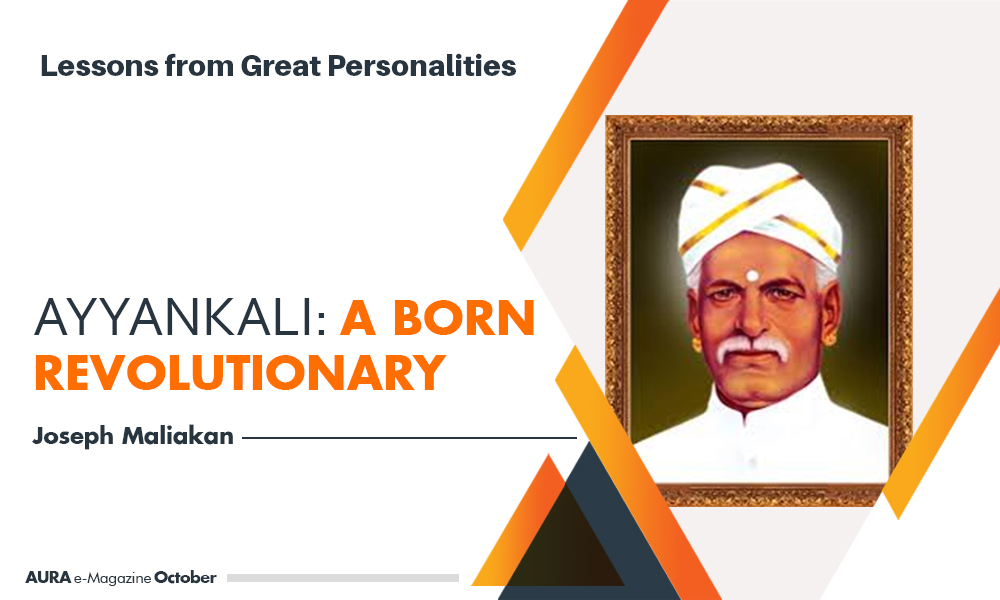AYYANKALI was born on 28 August 1963 to Ayyan and Mala in Venganoor, a small village 13 kilometres north of Thiruvananthapuram. His father, Ayyan, was the Adiyalan (Slave) of Panangott Ottilathu Parameswaran Pillai and would spend all his time working for the landlord. In appreciation of his loyalty, Pillai gave him five acres of land, and therefore, Ayyan could lead a relatively better life than other Pulayars. Even then, Ayyan persuaded his children to work for the landlord.
AYYANKALI was born and brought up in a social milieu where caste discrimination and untouchability were practised with extreme brutality. The Kerala society was the most caste-ridden and practised the worst forms of untouchability, far worse than those prevalent in other parts of India. It had elements of untouchability as well as unseeability!
AYYANKALI is the first social reformer in Kerala society produced from among the Dalits. He was a born revolutionary who organised the untouchables and fought for their human dignity and rights. Born and raised on his father’s five acres of land, when he went out, he faced several impediments. He thought about the reasons for the various discriminations faced by his people, the Pulayars.
He concluded that these violations of his people’s rights had no logic or validity. AYYANKALI, who was brought up in the forest, believed in the unbridled freedom of human beings. When he came out, he first encountered that he and his people had no right to use public spaces, including public roads.
He met people in authority and asked permission to use the public road. Since the road was for everyone, he walked on it, not bothered by the consequences.
In 1893, by travelling through a public road in a Villuvandi (a specially decorated bullock cart that only an upper caste could ride), Ayyankali willfully violated the upper caste’s diktats that only they could use a public road. Even buying a Villuvandi by a Pulaya itself was a violation of the social code, let alone riding it dressed in white clothes with a headgear.
Before he undertook the Villuvandi yatra, Ayyankali had organised the youth in his community into a fighting force willing to undertake missions to enforce the rights that are natural to all human beings.
He then unilaterally urged his people, who had been working for their landlords for seven days a week since time immemorial, to stop working on Sundays and use that day for rest, discussion of problems faced by the community, and finding solutions.
His next step was to regulate the time of work. The Pulayars were used to work in the fields from Sunrise to Sunset, at least 12 hours a day. Ayankali advised his people to restrict working to eight hours, and his people followed his letter and spirit instructions. The landlords could do nothing about the matter; they accepted the timings as a fait accompli.
AYYANKALI asked his people to take the wages for their work only in cash, not in kind, that is, raw rice, half of which used to be chaff. He said that with money, they could buy what they wanted, prepare, and eat it as they liked.
As a member of the Srimoolam Praja Sabha, 1911, Ayyankali never tried to get any favours from the government for the Dalits. He always strived to ensure that the human and constitutional rights denied to the Dalits because of years of caste discrimination were restored to them.
In his lifetime, he never begged for anything before anyone. He forcibly obtained certain rights for his people—that was his specialty. He got the right to use public roads by riding a Villuvandi, which until then was prohibited for a Dalit.
Since 1914, the confrontation between the Dalits and Nairs on using public space, dressing, ornaments, and cleanliness has increased. There were several uncivilised strictures against the Dalits. They were not allowed to wear any clothing above the waist or below the knees, and this rule was applied to both men and women. The women also had to wear Kallum Malayum. This particular ornament of the Pulayar women was a mark of subordination and savagery.
AYYANKALI urged the Pulayar women to stop wearing these ornaments. In South Travancore, the women threw them away. However, upper castes opposed similar movements in Quilon, leading to violent clashes. He convened a meeting of the Pulayars presided over by the reformist Changanassery Parameswaran Pillai. At the meeting at Neyyatinkara, Ayyankali exhorted all the Pulayar women present to cut off their Kallum Malayum. Thousands of Pulayar women cut off the ornaments, and it was endorsed by the people irrespective of caste or creed.
When Pulaya children were denied admission to government schools, Ayankali organised the first agricultural strike to force the upper caste to admit them to schools. Ayyankali’s action was unique in that the agri strike was not carried out to increase wages or reduce working hours but to ensure the implementation of educational rights. Before B.R. Ambedkar, Ayyankali, who had no formal education, had realised the path to attaining equal rights lay in education.


0 Comments